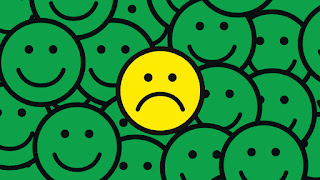Toxic Positivity
It may seem oxymoronic, but toxic positivity is real, and it's alarmingly present lately.
"Toxic positivity or positive toxicity is dysfunctional emotional management without the full acknowledgment of negative emotions, particularly anger and sadness." [1]
I hadn't really thought much about this term until a few weeks ago. I was having a conversation with a colleague about how things are going for her upon return to "normal" following two and a half years of pandemic realities. She broached a couple of issues she has been confronted with.
The first was a question about resiliency. She alluded to the frequently heard statement that "we've learned how to become more resilient during the pandemic," and questioned how we actually know that, and what if we actually didn't? These are very, very good questions, and led to our subsequent dialog about toxic positivity.
I'd be hard-pressed to identify a single person in my sphere of colleagues, acquaintances, friends, and family who did not endure some sort of loss during the pandemic. It came in many forms from the incredibly sad and tragic loss of life to folks losing their livelihood, 2020 kids not experiencing their graduation, canceled travel plans, social connections, and a broad range of other specific ways we all felt cheated by the realities of the global pandemic. With loss comes a diverse range of emotions. I don't believe there is even a remote chance that every person who experienced one form of loss or another during the pandemic has come to fully acknowledge the emotions surrounding their pandemic experience. To proclaim that the varied negative experiences are behind us and we're now collectively emerging on the tail end of Covid in a hopeful and resilient state of mind would be grossly optimistic.
It's just not that simple.
The perceived end of a rough patch in time does not coincide with an immediate and smooth shift to a new alternate condition. There are lingering feelings and emotions. These need to be reconciled before we can begin to rebuild ourselves and engineer a renewed perspective. The process takes time; it can't be rushed. Each of us will arrive at the place we arrive, and that is a deeply personal process. It's unfair and unreasonable for others to impose a timeline or trajectory for this.
“Positive thinking is a coping mechanism, an automatic coping mechanism. It is void of life. Feeling and experiencing the realness of what is actually happening are the essences of being alive. Feeling, connecting, reacting to the flow-- this is all living. Positive thinking happens in the head, meanwhile, it denies the heart its authentic, genuine feelings. Not only does it have the potential to rob you of real and deeper connection which is ultimately necessary to living a passionate and compassionate life; but it even has the potential to cut you off from reality itself. A mask that you put on your face, other people's faces, and throw over everything around you. We do not become positive by refusing to be real. We become positive people by really living, really feeling, and really rising above anything that would threaten to sink us. You can't even see what threatens to sink you if you refuse to acknowledge that it's even there. Why did Titanic sink? Someone refused to see the icebergs.”
―
Positive thinking sounds like a really good construct, but it needs to fit for it to work for us. We alone are the only ones who can discover what we personally need to feel positive. When we lose our way we need a guide to get us back on track; a compass that points us somewhere tangible and real, even when we have no idea whether that's the direction we want to go. There is comfort in direction and knowing where the barriers are so we can adjust and avoid them. The compass doesn't lie. It points us in the right direction, but it doesn't deny that there will be icebergs floating in our way.
Hope is not dishonest.
Hope can't tell a lie.
Hope is the thing that gets us to where we need to be, even if we don't exactly know where that is, and what we will have to overcome to get there. It's our most loyal companion on our hardest journeys.
[1] Wikipedia contributors. (2022, October 16). Toxic positivity. In Wikipedia, The Free Encyclopedia. Retrieved 02:59, October 31, 2022, from https://en.wikipedia.org/w/index.php?title=Toxic_positivity&oldid=1116492290
[2] Goodreads. (n.d.). A quote by C. Joybell C. Goodreads. Retrieved October 30, 2022, from https://www.goodreads.com/quotes/10205129-positive-thinking-is-a-coping-mechanism-an-automatic-coping-mechanism



Comments
Post a Comment